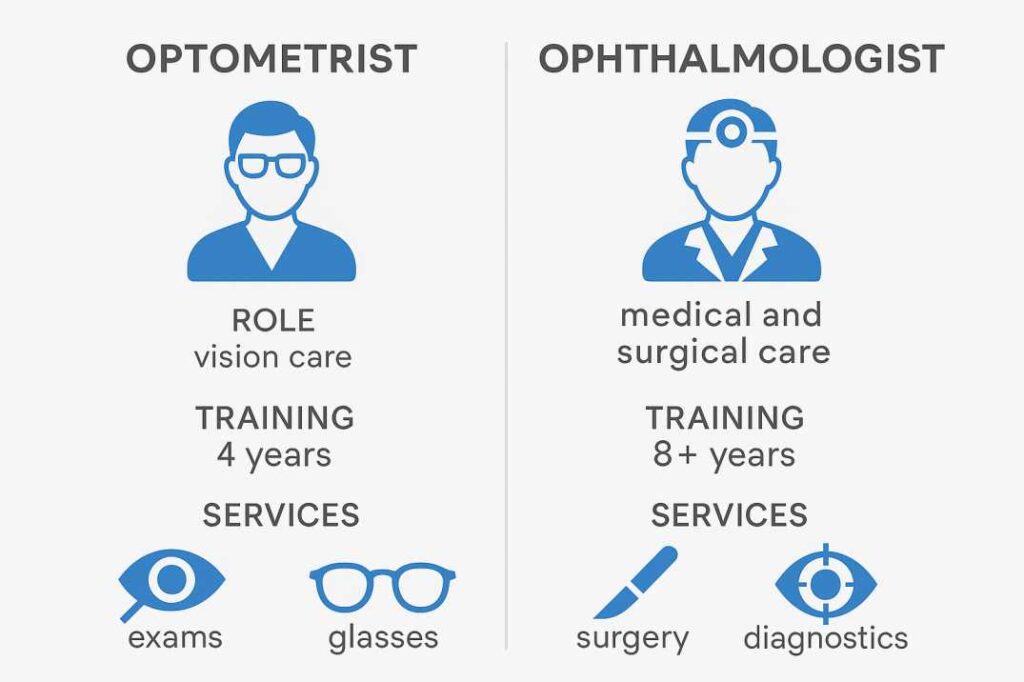Seattle Eye Care: Optometrists vs. Ophthalmologists
Not sure whether to visit an optometrist or ophthalmologist in Seattle?
This quick guide explains who to see, when, and why—so you can protect your vision with confidence.
Key Takeaways: Optometrist vs. Ophthalmologist in Seattle
-
Optometrists in Seattle are your go-to for routine eye care, including annual exams, contact lens fittings, dry eye treatment, and early detection of eye diseases.
-
Ophthalmologists are medical doctors who handle complex eye conditions, perform surgeries (like cataract or LASIK), and manage eye emergencies or systemic disease-related vision issues.
-
In Washington State, optometrists have expanded authority, including prescribing medications and managing some pre-/post-operative care—though surgery is still reserved for ophthalmologists.
-
Cannon EyeCare exemplifies the optometrist’s role in Seattle, offering advanced diagnostics, dry eye management, and close collaboration with ophthalmologists for surgical or complex cases.
-
Collaborative care ensures smooth transitions between optometrists and ophthalmologists, supporting patient outcomes through shared records and expedited referrals.
-
Cost considerations vary: optometry services typically range from $75–$250, while ophthalmology consults and diagnostics may exceed $800 depending on complexity.
-
Insurance navigation is key—vision insurance generally covers optometry, while medical insurance (or Medicare) applies to disease-related or surgical care.
-
Choose providers based on credentials, specialties (like dry eye or retina), advanced technology, location, and alignment with lifestyle needs—especially relevant in Seattle’s tech-driven, climate-sensitive environment.
Optometrist vs. Ophthalmologist in Seattle
Unsure which eye care specialist you need? Here’s a simple breakdown for Seattle residents:
Visit an Optometrist (like Cannon EyeCare) for:
-
Annual eye exams & vision changes
-
Contact lens fittings/adjustments
-
Routine vision correction (glasses, contacts)
-
Early eye disease screenings
See an Ophthalmologist for:
-
Eye surgery consultations (cataracts, LASIK)
-
Complex conditions (glaucoma, macular degeneration)
-
Eye emergencies/trauma
-
Medical treatments (injections, laser therapy)
-
Second opinions for serious diagnoses
Understanding Optometrists: Your Primary Eye Care Experts
What Does an Optometrist Do?
Optometrists act as primary eye care providers—similar to family doctors for general health. Holding Doctor of Optometry (OD) degrees, they deliver:
-
Comprehensive eye exams using advanced diagnostic tools
-
Diagnosis and treatment of common conditions (dry eye, conjunctivitis, minor infections)
-
Prescriptions for corrective and specialty contact lenses
-
Early detection of eye diseases like glaucoma and diabetic retinopathy
-
Medication prescriptions (authorized in Washington State since 2003)
Education and Training
Becoming an optometrist requires:
-
Bachelor’s degree with science prerequisites
-
Four-year accredited Doctor of Optometry program
-
Clinical rotations across hospitals and specialty practices
-
Optional residencies (pediatric optometry, ocular disease)
-
State licensing exams and ongoing continuing education
*Total training: Approximately 8 years post-high school.*
When to Choose an Optometrist in Seattle
Seattle residents rely on optometrists like Cannon EyeCare for:
-
Routine Care:
-
Annual eye exams
-
School/work vision screenings
-
Computer vision assessments
-
-
Vision Correction:
-
Nearsightedness, farsightedness, astigmatism
-
Presbyopia (age-related focus issues)
-
Specialty lenses (multifocal, toric)
-
-
Common Conditions:
-
Dry eye syndrome (notably aggravated by Seattle’s climate)
-
Pink eye, minor infections, allergies
-
Minor injury evaluations
-
Understanding Ophthalmologists: Medical and Surgical Eye Experts
What Does an Ophthalmologist Do?
Ophthalmologists are medical doctors (MDs/DOs) specializing in comprehensive eye care, including:
-
Advanced treatments for complex eye diseases
-
Surgical procedures (cataract removal, retinal repair)
-
Specialized diagnostic testing
-
Management of vision-related systemic conditions (diabetes, hypertension)
-
Emergency care for trauma and sudden vision loss
Education and Training
Becoming an ophthalmologist requires:
-
Bachelor’s degree with pre-med coursework
-
Four-year medical school (MD/DO degree)
-
One-year medical/surgical internship
-
Three-year ophthalmology residency
-
Optional fellowship (1-2 years for subspecialties)
-
Board certification and ongoing education
*Total training: 12-14 years post-high school*
When to Choose an Ophthalmologist in Seattle
Seattle patients should seek ophthalmologists for:
-
Surgical Needs:
-
Cataract surgery (over 4,000 performed annually locally)
-
Glaucoma surgery
-
Retinal procedures
-
-
Complex Conditions:
-
Emergencies:
-
Sudden vision loss
-
Severe eye pain/pressure
-
Chemical burns or trauma
-
New floaters/flashing lights
-
Scope of Practice: Washington State Eye Care Regulations
Washington State empowers optometrists with broader responsibilities than most states, ensuring accessible eye care for Seattle residents.
Optometrist Capabilities in Washington
Licensed optometrists like those at Cannon EyeCare can provide:
-
-
Dilated comprehensive eye exams
-
Glaucoma testing (intraocular pressure, visual fields)
-
Retinal imaging (OCT, photography)
-
Corneal topography
-
-
Treatment Authority:
-
Prescription medications (topical/oral) for infections, inflammation, and glaucoma
-
Pre/post-operative care for select procedures
-
Medication injections around the eye (periocular)
-
Optometrist Limitations
For patient safety, WA optometrists:
-
Cannot perform internal eye surgery
-
Cannot administer intraocular injections
-
Refer complex surgical cases to ophthalmologists
Collaborative Care in Seattle
Cannon EyeCare partners with Seattle ophthalmologists through a coordinated model:
-
Optometrists: Manage routine care, early disease detection, and chronic condition monitoring
-
Ophthalmologists: Handle surgeries and complex treatments
-
Shared Care: Seamless patient transitions and unified records
-
Priority Referrals: Expedited access to specialists when needed
Cost & Insurance: Seattle Eye Care Financial Guide
Average Costs in the Seattle Area
Optometrist Services (e.g., Cannon EyeCare):
-
Comprehensive eye exam: $150–$250
-
Contact lens fitting: $100–$200
-
Follow-up visits: $75–$150
Ophthalmologist Services:
-
Initial consultation: $200–$400
-
Specialized testing (OCT, visual fields): $300–$800
-
Surgical consultation: $300–$500
Insurance Navigation Tips for Seattle Patients
Most Private Plans:
-
Cover annual exams with optometrists
-
Require referrals for ophthalmologist visits
-
Prioritize coverage for medical eye issues (e.g., glaucoma, infections)
Medicare in Washington State:
-
Annual exams covered if medically necessary (e.g., diabetes)
-
Full coverage for cataract surgery and post-op care
-
Diabetic eye exams are reimbursed yearly
Vision Insurance (VSP, EyeMed):
-
Focuses on routine optometry care (exams, lenses)
-
Often maintains separate networks for optometrists vs. ophthalmologists
-
Typically includes allowances for frames/contacts
Finding Your Ideal Seattle Eye Doctor: Key Selection Factors
Choosing an Optometrist (e.g., Cannon EyeCare)
Prioritize providers who offer:
-
Credentials: WA state licensing + board certification
-
Specialized Expertise: Dry eye management, contact lens fittings, or pediatric care
-
Technology: Advanced diagnostics (OCT, corneal topography)
-
Accessibility: Convenient Seattle location + flexible scheduling
Selecting a Seattle Ophthalmologist
Look for these critical qualities:
-
Advanced Credentials: Board certification + subspecialty training (e.g., retina, glaucoma)
-
Hospital Affiliations: Swedish Medical Center, UW Medicine, or Virginia Mason
-
Proven Experience: Surgical outcome data for procedures like cataract surgery
Seattle-Specific Eye Care Considerations
Addressing Local Environmental Factors:
-
Climate Challenges:
-
Seattle’s humidity shifts intensify dry eye symptoms (prioritize practices with dry eye specialists)
-
Summer UV exposure requires premium protective lenses
-
-
Lifestyle Needs:
-
Tech professionals: Seek computer vision assessments and blue-light filtering options
-
Outdoor enthusiasts: Require sports vision evaluations and prescription goggles/sunglasses
-
-
Aging Population:
-
Collaborative clinics (like Cannon EyeCare + surgical partners) simplify care for conditions like cataracts
-
Choosing between an optometrist and an ophthalmologist in Seattle depends on your specific eye care needs—from routine exams to advanced surgical treatment. By understanding the roles, training, and services each provides, you can make informed decisions that protect and enhance your vision.
Ready to take the next step in your eye care journey?
Schedule a comprehensive exam with Cannon EyeCare or request a referral to a trusted Seattle ophthalmologist today. Your eyes deserve expert care.
FAQs
-
Optometrists are primary eye care doctors who handle routine exams and prescribe glasses, while ophthalmologists are medical doctors who perform eye surgery.




